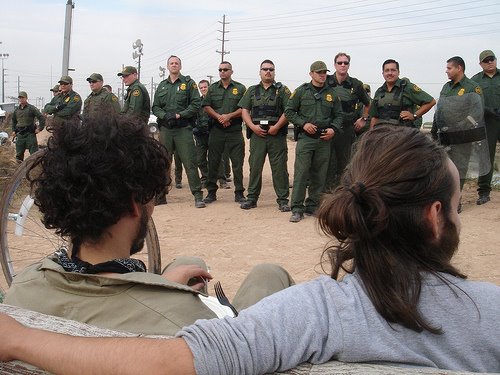Kristin Collins
North Carolina News & Observer
Nov. 22, 2009
The federal government said it was revamping its deportation agreements with local sheriffs to focus on ridding the country of dangerous felons. But some North Carolina sheriffs who signed the agreements have not been asked to change their practices.
Lawyers and advocates say the controversial program, which allows sheriff's departments to help identify illegal immigrants and begin deportation proceedings, is operating virtually unchanged - resulting in the deportation of people charged with offenses as minor as disorderly conduct and driving without a license.
A month after the new agreements took effect, Wake County is still putting into deportation proceedings more illegal immigrants who were arrested on misdemeanor charges than those detained in felony cases.
Wake Sheriff Donnie Harrison confirmed that his department has not changed the way it implements the program.
"We do the same thing if you're charged for murder or if you're charged with no operator's license," said Harrison, one of seven North Carolina sheriffs who have the program. "Nothing has changed for us."
Officials with federal Immigration and Customs Enforcement announced in July that they would ask all participating law enforcement agencies to sign new agreements, which they said would bring the program in line with its original goal of removing drug offenders and violent criminals from the country. Departments were required to sign the new agreements by mid-October.
The revamp came after Joe Arpaio, sheriff in Maricopa County, Ariz., drew national scrutiny by using the program to round up illegal immigrants and imprison them in tents in the desert.
Most North Carolina sheriffs use a different model of the program, in which they check the immigration status of those brought into jails for other crimes, but their programs have also drawn accusations of racial profiling. The American Civil Liberties Union of North Carolina says the program encourages law officers to jail immigrants on minor crimes for the purpose of checking their immigration status.
ICE spokeswoman Barbara Gonzalez said last week that the new agreements discourage profiling by requiring that local agencies see through all criminal charges against illegal immigrants before they are deported. In the past, many minor charges were dropped and the inmates handed over to immigration authorities.
She also said the agreements "clearly articulated ICE's priorities: identifying and removing criminal aliens who pose a threat to public safety or a danger to the community."
New intent, old methods
The agreement, however, does not lay out new practices for sheriffs. All foreign-born people who come through participating jails - the vast majority of whom are accused of misdemeanors and nonviolent crimes - continue to have their immigration status checked and, if they are here illegally, to be processed for deportation.
Harrison signed the new agreement Oct. 16. His statistics show that the number of immigrants put into deportation proceedings has not declined since it went into effect.
In October, 150 inmates were processed for immigration violations, and 84 percent of their crimes were misdemeanors. So far this month, 82 illegal immigrants have been processed, and 60 percent of the charges against them were misdemeanors.
Harrison said he continues to check the status of all foreign-born inmates; he would consider it discriminatory to "pick and choose" inmates to screen based on the seriousness of their alleged crimes.
Harrison said checks sometimes reveal that immigrants arrested for minor charges are wanted for more serious crimes or have previous deportation orders. "ICE hasn't said anything to us about changing anything," Harrison said.
Randy Jones, spokesman for Alamance County Sheriff Terry Johnson, an outspoken critic of illegal immigration and one of the state's first sheriffs to join the program, also said he has not changed the way he does immigration checks.
"We're doing it just like we've always done it," Jones said.
Jones and Harrison said it's the federal government's responsibility to decide which immigrants are deported.
'Really petty'
Marty Rosenbluth, a lawyer with the Southern Coalition for Social Justice in Durham who provides free services to immigrants, said he has represented people deported after such crimes as playing loud music and missing a child's truancy hearing. A few months ago, two teenage girls ended up in deportation proceedings after being involved in a fistfight at Wakefield High School.
Since the new agreements took effect, Rosenbluth said, he continues to field five to 10 calls a day, the majority from people picked up by local immigration programs.
"It's mostly driving and minor misdemeanors in every county," he said. "Most of the cases we're seeing continue to be really petty."
Rebecca Headen, an attorney with the Raleigh office of the American Civil Liberties Union, said the new agreement does little to address concerns that the program allows officers to target immigrants for minor crimes.
"It's more of an aspirational suggestion," Headen said.
One North Carolina sheriff, Earl "Moose" Butler of Cumberland County, declined to sign the new agreement and dropped out of the program.
Debbie Tanna, a public information officer for the Cumberland Sheriff's Office, said the program used county resources to help deport mostly minor criminals while largely failing to turn up dangerous felons or immigrants wanted for crimes in other states.
"The sheriff did not like the way the program was working," Tanna said. "He said it was more of a headache than a working tool."
Read @: http://www.newsobserver.com/102/story/205289.html

No comments:
Post a Comment